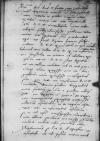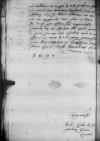Letter #1674
Stanisław KOSTKA to Ioannes DANTISCUSMarienburg (Malbork), 1537-07-14
| received [1537]-07-18 Manuscript sources:
Auxiliary sources:
| ||||||
Text & apparatus & commentary Plain text Text & commentary Text & apparatus
Reverendissimo Domino, Domino
Reverendissime Domine, domine et fautor semper colendissime.
Post obsequiorum meorum o(mniu)m promptitudinem.
Doleo, et quidem maxime, civem Golubensem litteris meis pro impetranda gratia Reverendissimae Vestrae Dominationis commendatum coram eadem indignum quidq(uam) admisisse, quod, cum contra animi mei sententiam summa protervitate egit. Ut facti dignam poenam subsecutam, Reverendissima Vestra Dominatio experietur, in ipsum animadvertam adscribed⌈animadvertamanimadvertam adscribed⌉.[1]
Quod vero eadem Dominatio Vestra Reverendissima ex me informari postulat, an poenam ab adultero exegerim nec ne, Dominatio Vestra Reverendissima scire dignetur me nec ullam multam ab eo aut quocumque altero exegisse, tum nec burgrabium meum extorsisse investigatus sum, qui taceo(?) me iurisdictioni Reverendissimae Vestrae Dominationis immittere.
Verum quidem burgrabius meus fatetur se olim a quodam adolescente, qui uxorem non habuit et virginem impregnavit, sexagenam accepisse allectus consuetudine in ea regione observata, ubi, ut informatus consuetum se in tali casu transgressor iurisdictionem iudicis secularis, priusquam spiritualis inciderit, multa iudici seculari cedit.
Nihilominus, si Dominatio Vestra Reverendissima id aegre fert, nec consuetudo, nec ius ipsum tantum apud  AAWO, AB, D. 4, f. 129v me valebunt, ut ea gratia Reverendissimae Vestrae Dominationis praeferam, saltem hidden by binding⌈[tem]tem hidden by binding⌉ me animum eius declarare dignetur. Tum ab adultero commissi delecti multam nec ego aut mei exigerunt. Erga quem non dubito, Reverendissima Vestra Dominatio pro officio suo conservabit, quamvis uti res admittit illi gratiam precor.
AAWO, AB, D. 4, f. 129v me valebunt, ut ea gratia Reverendissimae Vestrae Dominationis praeferam, saltem hidden by binding⌈[tem]tem hidden by binding⌉ me animum eius declarare dignetur. Tum ab adultero commissi delecti multam nec ego aut mei exigerunt. Erga quem non dubito, Reverendissima Vestra Dominatio pro officio suo conservabit, quamvis uti res admittit illi gratiam precor.
In quam servitiis meis assiduis unice commendo hidden by binding⌈[do]do hidden by binding⌉, offeren(s) me votis Reverendissimae Vestrae Dominationi semper paratissimum hidden by binding⌈[um]um hidden by binding⌉.
Quam Deus Omnipotens in longissima tempora hidden by binding⌈[ra]ra hidden by binding⌉ sanam conservet.
Dat(ae) or >Dat(um)⌈Dat(ae)Dat(ae) or >Dat(um)⌉
Eiusdem Reverendissimae Dominationi Vestrae obsequentissimus


